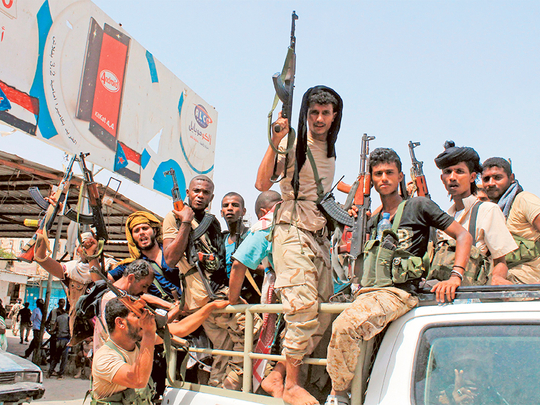
Al Mukalla: The exiled Yemeni president’s decision to merge anti-Al Houthi fighter groups into his armed forces has continued to generate debate, especially in the southern parts of the country, the strongholds of the separatist Southern Movement.
To “reward” armed men who fought off Al Houthi incursions into their territories, the Riyadh-based Abd Rabbo Mansour Hadi ordered last week the allied Supreme Defence Council to recruit resistance fighters who fought along with government forces in the ongoing war with Al Houthi forces.
Bloody clashes erupted in many provinces in the restive south in March when the north-based Al Houthis militia backed by well-trained and better armed forces loyal to the former president Ali Abdullah Saleh advanced into the strategic port city of Aden to dislodge Hadi’s government. Similar clashes broke out in Taiz and Mareb provinces.
Shortly after Hadi’s decision, separatists in the south said that they would not join Hadi’s army and would continue fighting until they achieve their goal of “reviving the South Yemen state” that united with the north in 1990.
“They should merge resistance fighters in Taiz, but South resistance will be the nucleus of a new army in South Arabia,” said brigadier general Ali Mohammad Al Sa’adi, a senior separatist and a founding figure of the Southern Movement and who is now fighting Al Houthis in Abyan province. Also, Yahya Al Shouabi, a pro-independence lawyer, said that Hadi does not have a standing army in the south and only their separatists fighters are battling the Al Houthis.
“The timing of the decision is unfortunate. The [southern] resistance seeks the revival of the state, not jobs,” Al Shouabi told the Kuwaiti newspaper Al Seyassah on July 30.
In the south, not all anti-Al Houthis fighters share the views of the separatists. Ali Al Ahmadi, a spokesperson for the Popular Resistance, told Gulf News on Tuesday that he hails Hadi’s decision to merge the fighters with army units as it would “fill” a security vacuum in the country.
“We welcomed the move and we deem it as a necessary step following the crumbling of the former army and it also meets public demand for assimilating the resistance fighters by given them jobs.”
Al Ahmadi said that the fighters in Aden include Southern Movement fighters, Salafists and many unaffiliated fighters.
“There are thousands of people who took up arms and fought the Al Houthis in Aden,” he said.
Regarding separatists’ opposition to Hadi’s order, Al Ahmadi said that many senior military officers from the Southern Movement have agreed that the decision serves their cause since it builds an army from the south.
Since the beginning of recent conflicts in Yemen, thousands of militiamen have been enlisted in the army. Following the civil war in 1994 between the two former states of Yemen, thousands of Islamists and tribal fighters who backed the victorious Saleh were merged into the army. In 2011, when Arab-Spring protests overthrew Saleh, thousands of his opponents were hastily added to the country’s armed forces.
In an attempt to defuse tension with the Al Houthi militiamen who took control of the capital in September, Hadi proposed in late 2014 that 20,000 of their fighters be recruited into the army, according to media reports. The Al Houthis refused the proposal and insisted on merging 75,000 of their supporters in the army.
Despite a warning by some analysts that the current government would repeat its predecessor’s mistakes if it dismissed armed forces that oppose them, Major General Mohammad Ali Al Maqdeshi, the army chief of staff, has recently said that Saleh’s “rebellious” forces would not have a place in the new army.
Abdul Salam Mohammad, the director of the Sana’a-based Abaad Studies and Research Centre said that army soldiers who fought with the Al Houthis should be repositioned not dismissed.
Mohammad said that Hadi’s decision to merge resistance with the army would “prevent chaos” and stop the country from sliding into civil war. “This decision curbs the appearance of post-war militias, legalise the resistance and gives it a role in restoring peace, and stopping the chaos.”












